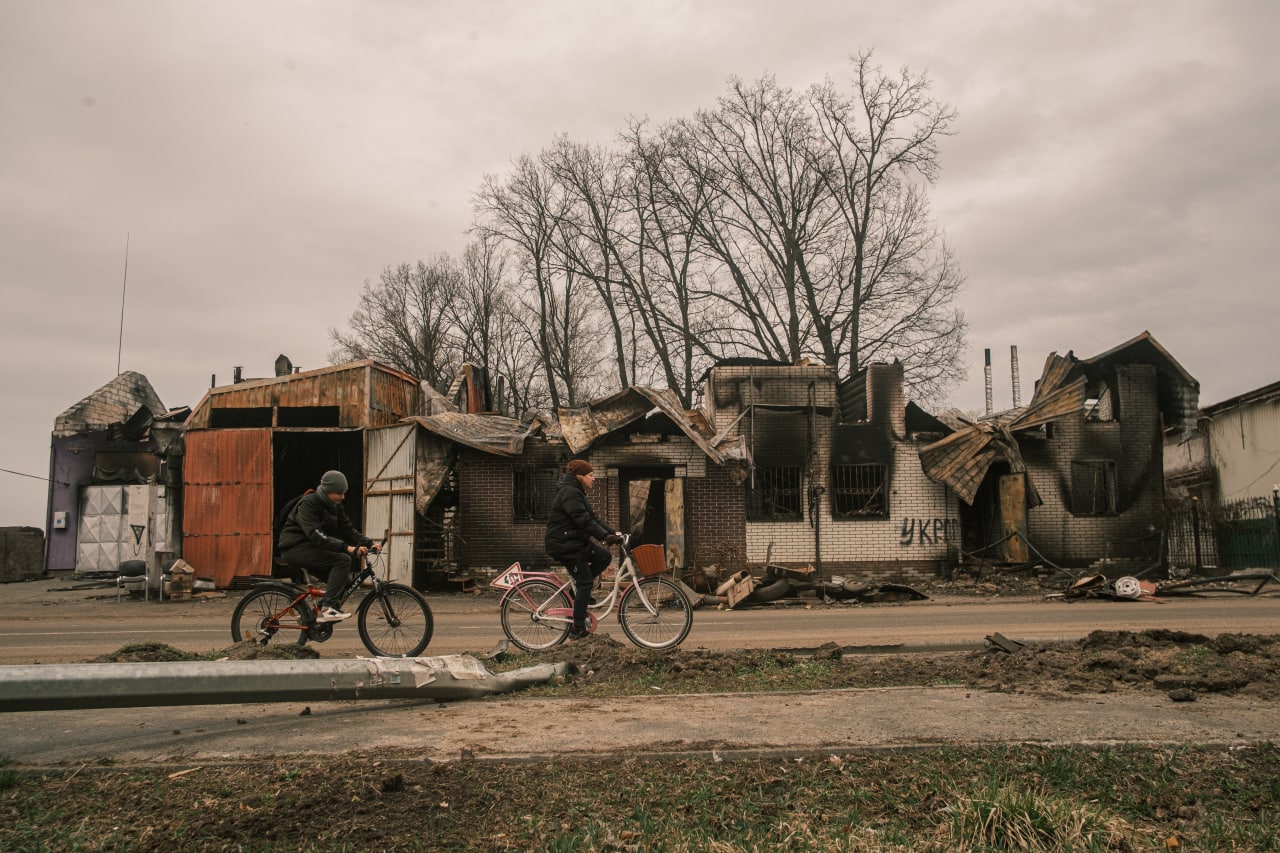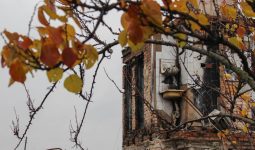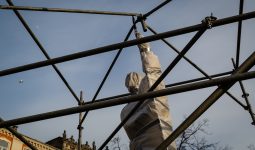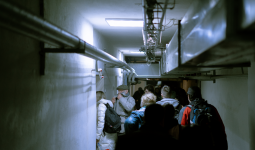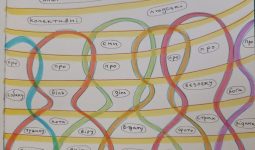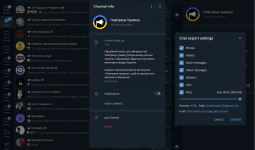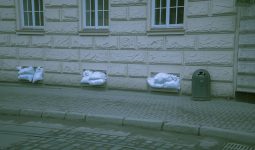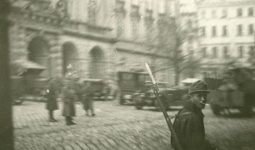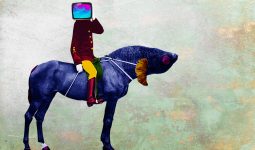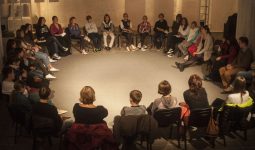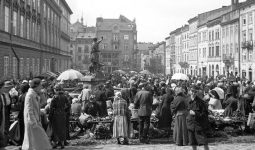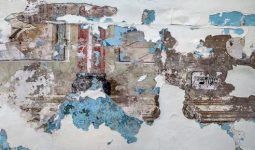24.02.22, 5 am: Testimonies from the War
March 2022 – present
On February 24, 2022, at 5 a.m., the life of people in Ukraine got divided into "before" and "after." On this day, Russia's President, Vladimir Putin, announced the beginning of a "military operation" and launched a full-scale war with the bombing, rocket attacks, artillery shelling of cities, invasion of armoured vehicles, and the military. The war caused terrible destruction, death, and suffering. Millions of people were compelled to leave their homes (according to the estimates of the UN Refugee Agency, it is one-third of Ukraine's population), and millions found themselves under occupation or had to survive in proximity to the battlefront. Residents of different parts of the country mobilized, each in their own activity, to counter the invasion and help those in need.
At the beginning of March 2022, academic organizations in Ukraine, Poland, Luxembourg, and the UK joined their efforts to implement a documentation project named "24.02.22, 5 a.m.: Testimonies from the War." The situation in Ukraine was changing rapidly, and we set the goal of recording human experiences so that they could be archived and preserved for the future. We understood a number of security, ethical, and methodological challenges associated with this type of project. At the same time, as oral historians and memory scholars have shown, personal testimonies change over time, crystallizing in institutional forms and ways of expression. Together with colleagues who have experience in researching the situations of extreme violence, we have developed a highly flexible guide and protocols for dealing with complex emotions; we minimized the risks of including vulnerable narrators and conducted interviews only where it was justified from the point of view of safety. We agreed to meet again with each storyteller we recorded for this project.
In the six months of our work, between mid-March and mid-September 2022, we collected over 150 stories. Each of them opens up a series of stories about the everyday life of war. These are stories about life under shelling and rethinking the value of the social, evacuation and geography that has acquired a new materiality, home and the lace of memories that tie us to space, frozen and stolen time, navigating information flows, corporeality, finding one's place, fear, love, trust, and hope. Together with the storytellers, we move through the watershed on February 24, 2022, but in the flow of war, we also return to 2014. People decide for themselves where to direct their story, and what to pay attention to, and our questions serve more as clarifications to this story. This openness creates a field for the emergence of a variety of details that show how people live in the war reality.
As part of the initiative "24.02.22, 5 am: Testimonies from the War" initiative, we separately recorded the stories of forced migration of academics (coordinated by Iryna Pyatnitskova). Between October and December 2022, we held 16 conversations with educators from Donetsk, Mariupol, Dnipro, Mykolaiv, Odesa, Sumy, Chernihiv, Kharkiv, Ostroh, and Kyiv, who shared their experiences of adapting the educational process to wartime conditions, the self-organization of students and professors in times of crisis. Conversations are also planned with representatives of the initiatives in reconstruction (coordinated by Mariia Gryshchenko) and rehabilitation (coordinated by Valentyna Shevchenko).
In the spring and summer of 2022, we held weekly methodological training seminars for interviewers with the participation of scholars and researchers working on the topics of trauma, violence and war in a global context. Regional teams joined weekly supervision meetings, and project participants also received psychological support.
The international network of institutions that joined the documentation initiative includes the following partners and national project managers:
- Center for Urban History, Dr. Sofia Dyak (for Ukraine)
- Institute of Philosophy and Sociology of the Polish Academy of Sciences, Dr. Anna Wylegala (for Poland)
- Polish Oral History Society, Dr. Marcin Jarzabek (for Poland)
- University of St. Andrews, Dr. Victoria Donovan (for the United Kingdom)
- Centre for Contemporary and Digital History of the University of Luxembourg, Prof. Dr. Machteld Venken (for Luxembourg)
- Public History Department at FernUniversität Hagen, Prof. Dr. Felix Ackermann
- The Research Centre for Contemporary History in Hamburg (FZH), Dr. Linde Apel
- Ludwig Maximilian University of Munich, Dr. Iryna Klymenko
The project's Principal Investigator is Dr. Natalia Otrishchenko.
The General Data Controller within the meaning of the GDPR in the EU is Prof. Dr. Machteld Venken.
The Ukrainian team involved at different times the following members: Oksana Dudko, Mariia Gryshchenko, Yevhen Horb, Artem Kharchenko, Myroslava Liakhovych, Roman Moldavskyi, Serhii Pakhomenko, Viktoriia Panas, Iryna Pyatnitskova, Valentyna Shevchenko, Diana Vonnak, Dana Yakovenko, Nataliia Zinevych.
ADVISORY BOARD
- Lukasz Biedka (Clinical Psychologist)
- Hana Kubatova (Charles University)
- Daria Mattingly (Cambridge University)
- Ivana Maček (Stockholm University)
- Stephen Naron (Yale University)
- Victoria Sereda (Institute of Ethnography of the National Academy of Sciences of Ukraine)
- Nerina Weiss (Fafo Institute for Labour and Social Research)
ACADEMIC BOARD
- Natalia Chernysh (Ivan Franko National University of Lviv)
- Yevhen Holovakha (Institute of Sociology of the National Academy of Sciences of Ukraine)
- Maryna Hrymych (writer, anthropologist)
- Barbara Engelking (Polish Center for Holocaust Research)
- Olesya Khromeychuk (Ukrainian Institute London)
- Kateryna Kralova (Charles University)
- Dariusz Stola (Institute for Policy Studies of the Polish Academy of Sciences)
- Maciej Wyrwa (Mieroszewski Center)
- Tetiana Zhurzhenko (University of Vienna)
The documentary initiative is supported by Körber Stiftung, Richard Langstaff's donation, Lund University (Einar Hansen's Research Foundation).
In the autumn of 2022, the initiative received support from the House of European History and the Foundation for Polish Science.
In January 2024, the initiative was formalized into the project "U-CORE: Researching the Collecting, Preserving, Analyzing, and Disclosing of Ukrainian Testimonies of the 2022 War" in collaboration of the Center for Urban History with the Institute of Philosophy and Sociology of the Polish Academy of Sciences and the Luxembourg Centre for Contemporary and Digital History.
***
Events:
- The first seminar of the initiative at the German Historical Institute Warsaw / 27-28.05.22
- The second seminar of the initiative at the Centre for Contemporary and Digital History at the University of Luxembourg / 23-25.11.22
- The Year of Documentation: Challenges, Experiences, Trajectories for Development / 28.4.2023
Presentations under the initiative:
- Facing Violence: When and Why to Document War Experiences?, 27.5.2022, The German Historical Institute Warsaw / zoom
- 24.02.2022, 5 am: Testimonies from the War, 22.6.2022, online / zoom
- "Who and Why Collect War Testimonies in Ukraine?"(Хто і навіщо збирає свідчення про війну в Україні?), Kyiv School of Economics / 22.08.22
- The Reconstruction of Ukraine: Ruination / Representation / Solidarity, online / zoom / 9-11.9.2022
- "Voices and Testimonies," EHRI Workshop “War Documentation. The Past and Present,” Center for Urban History / 06.10.22
- Narrating the War Everydayness, Harriman Institute at Columbia University, Нью-Йорк / 11.10.2022
- "24/02/22, 5 am documentation initiative", The Danyliw seminar on Contemporary Ukraine / 15.10.22
- "Researching the Impact od War on Society: Methodological Seminar" (Дослідження впливу війни на суспільство: методологічний семінар), CEDOS / 19.10.22
- Documenting War Experiences: Oral Testimonies and Social Media Archives in Ukraine, Russian and Eurasian Studies George Mason University, online / zoom / 31.10.2022
- "Testimonies from the War. An International Project at Center for Urban History in Lviv", Den Krieg dokumentieren: Ukraine 2014-2022 / 18.10.2022
- "Russian War Crimes – From Documenting To Punishment", Ivano-Frankivsk / 2-3.12.2022
- "Social studies in wartime: an open seminar", CEDOS, Lviv / 26.11.22
- "The war gave everyone a role — what’s yours?": Documenting Stories Amid Crisis, MacMillan Center for International and Area Studies, Yale University, New Haven / 12.12.2022
- All-Ukrainian round table "Countering the genocide of the Ukrainian people", Vinnytsia, Vasyl' Stus Donetsk National University / 09.2.2023
- "After the Interview: Ethical and Security Challenges in Recording Testimonies from the War" / "War, Science and Emotions: (Not)New Concepts and Approaches", NGO "Center for Applied Anthropology", Chernihiv, online / zoom / 21.2.2023
- "Towards a New Design of Ethical Committee" / "Witnessing the Now: Challenges of Emergency Documenting and Archiving in a Comparative Perspective", Institute of Philosophy and Sociology, PAS, Warsaw / 24.2.2023
- "Experience of documenting stories from the first months of the war: Initiative 24.02.22, 5 am" / "Narratives of War in Folklore, Literary and Media Texts", Ternopil National Pedagogical University named after V. Hnatiuk / 27.4.2023
- "Documentation requires a team", Museum of War Childhood / 04.5.2023
Publications in media:
- Podcast "Research in Ukraine: Where has it gone?", series “Ukrainian Scholars in Times of War”, 8.4.2022
- Podcast "Emergency Archiving in Ukraine", ZZF / 13.4.2022
- "We Fight for the Preservation of Memory", Detector Media / 20.5.2022
- "Speaking and Keeping Silent, and Speaking Again", Dwutygodnik / (in Ukrainian) / (in Polish) / 8.2022
Collectors of experiences: No one but you will tell about you and this war, LB.UA / (in Ukrainian) 25.4.2023
Academic publications:
- Пятницькова, І. (2022). Інформаційний потенціал для історичної науки документаційних ініціатив з фіксації досвідів війни Росії проти України / Міжнародний журнал Право і Суспільство 6, 179-188.
- Shumylovych, B.; Makhanets, O.; Nazaruk, T.; Otrishchenko, N.; & Brunow, D. (2022). Preserving the now! Mediating memories and archiving experiences in Ukraine / NECSUS European Journal of Media Studies. #Materiality, 11 (2), 126–49.
Credits:
Cover Image: George Ivanchenko
